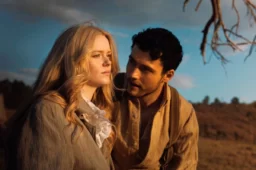![REVIEW: Wonder Women 1984 [Train Wreck or Triumph]](https://everydayexiles.com/wp-content/uploads/2021/01/wonder-woman-1984-350x350-1.jpg)
REVIEW: Wonder Women 1984 [Train Wreck or Triumph]
- January 12, 2021
- by
- Heather Moore
“Life is good…but it could be better!”
We often hear directors say that the location of their film is a character in the story, for WW84 that can be said of the backdrop of the 1980s. At first, we could be tempted to think that setting the sequel in the 80s is just a fun excuse for great outfits and nostalgia for the dying shopping mall. But director Patty Jenkins deserves more credit than that. The 1980s was a time of booming prosperity, big hair, big guitar solos, big promises. Promises from politicians, scheming businessmen, televangelists, and fitness instructors that our dreams could come true if we just followed them. If we gave them our vote, our money, more money…all our desires could be fulfilled. And then what happened? The cynicism and moodiness of the 90s. A social bursting bubble when we realized not all that glitters is gold. WW84 sets out to explore the promises of the things we believed, and the cost of their deception.
The film opens with young Diana (a delightful Lilly Aspell reprising her role) learning an important lesson back home in Themyscira. That cutting corners and taking shortcuts is appealing in the moment, but you’re only deceiving yourself and others with that approach. There is no honor or achievement without the truth. This shapes a huge part of Diana’s character and future trajectory. Wonder Woman is very much defined by a love for honor and truth, most obviously expressed by her wielding the Lasso of Truth.
As we catch up with Diana in 1984 America, her origin continues to shape her career. She frequently saves the day as Wonder Woman, but moves in public as Diana Prince, senior anthropologist specializing in Mediterranean civilizations at the Smithsonian. Not only is she using her superpowers to serve others, she is also using her extensive knowledge of ancient Greek mythology and culture to serve academia. This is who Diana fundamentally is, a woman who utilizes her talents and abilities to pursue truth in the world.
Spoiler Warning
This is where things start to get dicey. Diana and her colleague Minerva (played wonderfully by Kristen Wiig) come across a strange artifact. From the beginning, the artifact is giving us clues about its nature. It is a stone that appears to be valuable but is actually cheap and common, frequently used for counterfeits. It is mounted on a gold ring inscribed with Latin, indicating that it is a “Dreamstone” and that those who hold it will be granted a wish. But the glittering Dreamstone holds a dark secret. Eventually Diana realizes that it was created by the Greek god Dolos, a god of deception and treachery. The promise of the granted wish is actually a trick. The bearer will indeed receive what they desire, but it will cost them that which is most precious. In the attempt to take shortcuts to attain our desires, we lose much more than we receive. Diana unknowingly wishes for the love of her life, Steve Trevor, to return to her. He does, but it begins to impact Diana’s powers. And Steve isn’t truly restored to her, it is only his soul that is inhabiting the body of another man. A counterfeit for the real thing. It is a deceit that posits itself as a loving reunion but is costing Diana her ability to help others and costing the anonymous man the life he was leading.
The stone falls into the hands of Maxwell Lord, a pondsy-scheme-would-be oil baron determined to use the stone to give himself the status and power and acceptance that he has always craved. The movie shines with Pedro Pascal in this role, he creates a character that is layered with arrogance, desperation, insecurity and sadness. He wishes to become the stone itself, transforming him into a granter of wishes and stealer/thief of worth. As he tricks more and more people to make selfish and thoughtless wishes, the world around them descends into chaos. People make wishes based on self-interest and what they believe will make them happy and secure but the ripple effects damage everyone else. The stone takes far more than it gives, making those in its power believe they have it all.
This theme is an insightful exploration of the 1980s, the deceptions that we believed and what it cost us. It is also a powerful exploration of spiritual idolatry. As Christians, we believe that to worship anything other than God is to worship idols. To place our trust in something that promises us security and fulfillment. Wealth, achievement, relationships, acceptance, substances, political power. Things that glitter and make us feel on top of the world, but which erode us from the inside out.
15 The idols of the nations are silver and gold,
made by human hands.
16 They have mouths, but cannot speak,
eyes, but cannot see.
17 They have ears, but cannot hear,
nor is there breath in their mouths.
18 Those who make them will be like them,
and so will all who trust in them. – Psalm 135:15-18 (NIV)
As the psalmist says, we become like that which we trust. If we place our trust in things that are lifeless and empty, that is what we will become. But the Deceiver never stops with us. The real cost of idolatry is on the people around us. Those who love us, those who follow our influence, those under our care are the ones who suffer most. As Andy Crouch says in his excellent book Playing God, “idols ultimately claim our children.” It is the vulnerable in our lives and in our society that pay the highest price.
Maxwell Lord almost sacrificed his child in the pursuit of his own desires. It is only when Diana renounces her wish and walks away from the false shadow of Steve that she can see the truth about her situation and invite others into seeing the truth behind the glitter. The truth is hard, and costly, and humbling, but never so costly as living as a prisoner to lies.
This was true in the 1980s and continues to be more resonant then ever in 2020. Leveraging lies in order to attain and retain power have been rampant. Spinning false and dangerous narratives about the pandemic and about the outcome of the election have been driven by selfish desires for power. It is the vulnerable in society who have paid for this deceit. The next generation of young Christians are the ones who will be left to pick up the pieces of a Church in ruins. The children are the ones being most damaged. The truth is rarely comfortable, it is certainly rarely easy, but in the truth lies freedom. Freedom cannot be found in power plays, in shortcuts, in counterfeits of how we wish things were. It is only when we face and accept the truth for what it is and put others before ourselves that we can find genuine flourishing.






